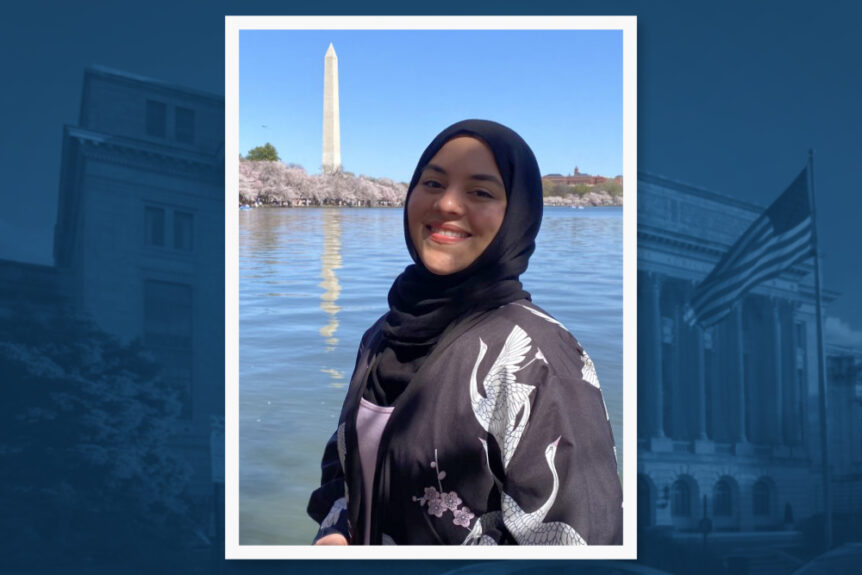Above: Raneem Karboji, 29th Class Emerson Hunger Fellow, at the Tidal Basin in Southwest Washington, D.C., in May, 2023.
Growing up in El Paso, Texas, I witnessed firsthand the struggles of hunger and poverty that many women and children in my community faced. Coupled with lived experience, I was inspired to pursue a career in public service, and I gained valuable experience working for both the city council and the Texas House of Representatives. In these roles, respectively, I worked as a liaison between constituents, elected representatives, and government and nonprofits to support community members in getting their needs met. I was excited to become a Bill Emerson National Hunger Fellow because the program focuses on bridging the gaps between local and national public policy efforts. When I was matched with the Food and Nutrition Service (FNS) at the U.S. Department of Agriculture (USDA), I was thrilled to join a governmental agency dedicated to improving access to nutritious food for children.
As an Emerson Fellow, my primary goal was to identify the best practices for administering Child Nutrition Programs in Residential Child Care Institutions (RCCIs). These institutions serve a unique population of children and youth, including those who are abused, runaway, chronically ill, or in juvenile detention centers. Although RCCIs are eligible to participate in Child Nutrition Programs, program requirements often apply differently to them. Therefore, my goal was to develop specific guidance to address their unique needs. Through this project, I aimed to bridge the gap between local efforts and national public policy by helping RCCIs administer Child Nutrition Programs more effectively.
I began this project by researching RCCIs that operate the National School Lunch Program (NSLP) and identified key areas of concern. With support from other team members, I am developing a guide that provides a reference for questions that are frequently asked and additional resources and best practices to improve program operations at RCCIs. One of the significant challenges that’s been identified is the lack of updated and easily accessible guidance. To address this, I am working to support the team to update online links, descriptions, and policy guidance, and develop a searchable database containing all current memoranda. The enhancements to the RCCI guidance and resources will help program administrators locate specific guidance more efficiently, which, ultimately, will improve the implementation of meal services in RCCIs, ensuring that children receive the nutrition they need to be successful.
The lack of updated and easily accessible guidance for RCCIS has been a challenge but I am encouraged by progress in making more resources available. Working to develop RCCI guidance has been a great learning opportunity for me and has increased my knowledge of USDA’s expansive efforts. I am a firm believer in resource advocacy, and I am fortunate to learn from a great team who want to increase the reach of Child Nutrition Programs and ensure that they are more easily understood. The School Meals Policy Design branch at USDA has encouraged me in my professional growth and I actively see it as I have worked on the RCCI guidance with the team, along with other policy-related assignments.
In conclusion, my experience as an Emerson Fellow has been incredibly fulfilling and my placement with FNS to develop comprehensive guidance for RCCIs administering Child Nutrition Programs has been an eye-opening experience. I am confident that the guidance we are developing will make a meaningful difference in the lives of RCCI residents and bridge the gap between local efforts and national public policy. I am grateful for the support and encouragement from the USDA and the Bill Emerson National Hunger Fellowship, and I look forward to continuing to make an impact where I can. Special shout-outs to Tony, Paige, Emma, Michelle, and Wes for their support. And to my wonderful family and beloved border community that raised me – thank you.

